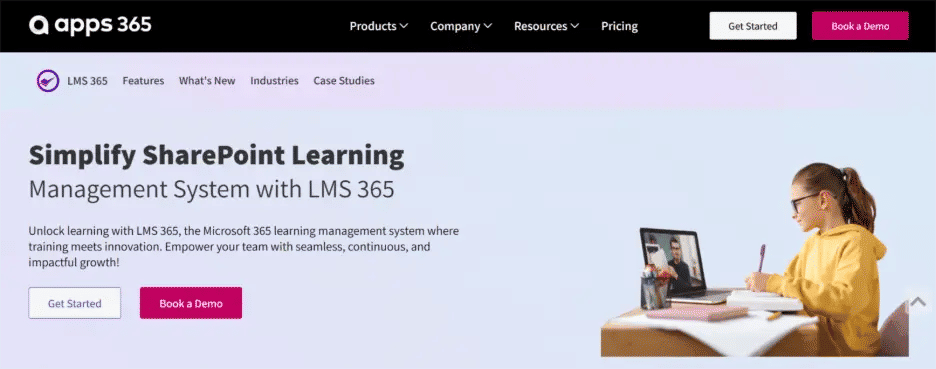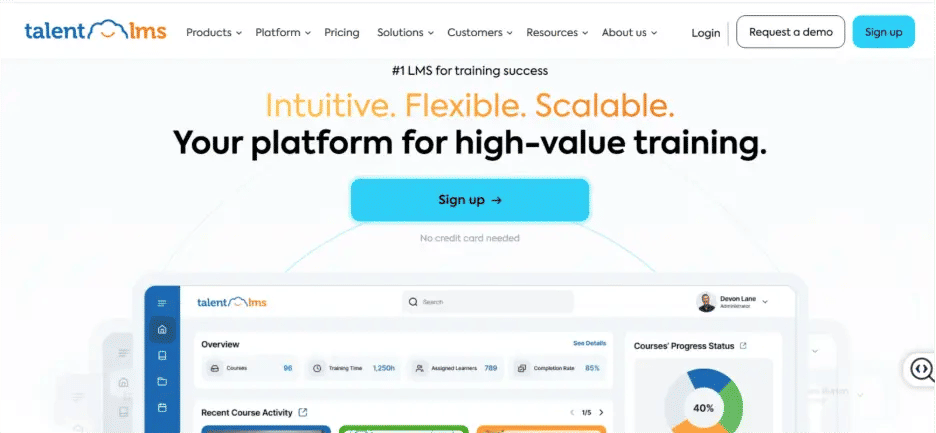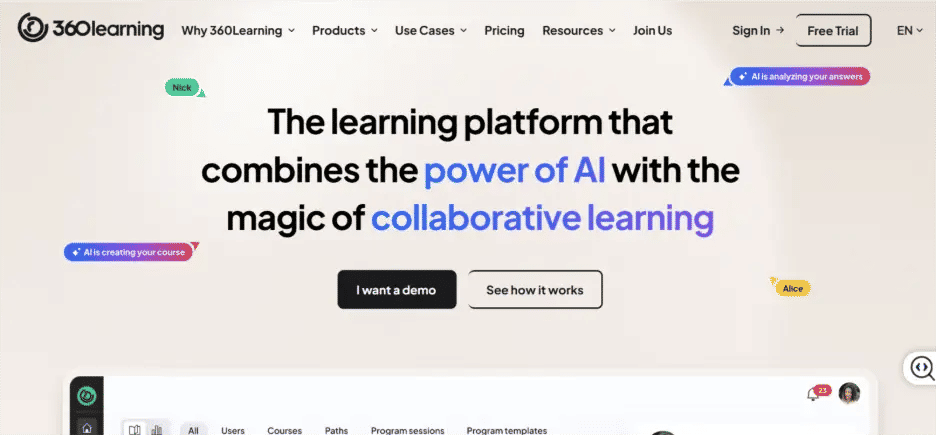
According to the LinkedIn Learning Report (2023), 94% of employees would stay longer at a company that invests in learning and growth. In a startup, every second matters and so does every person you bring in. You are building some bring from the ground up, and you cannot afford to waste time or talent. Every new hire needs to learn quickly, deliver confidently, and feel like they belong. But that only happens when there is a clear and simple way to train them.
✨
Quick Read
Summary generated by AI, reviewed for accuracy.
An LMS helps startups train faster, keep learning consistent, and centralize all training materials in one place. It saves time, reduces confusion, and supports remote or hybrid teams with mobile-friendly access. This ensures every new hire learns quickly and performs confidently from the start.
For small businesses, an LMS builds stronger culture, supports cross-training, and retains knowledge even if employees leave. It scales easily, boosts productivity, and lowers training costs helping teams stay aligned, skilled, and ready to grow without slowing down.
A good learning system does more than just teach it helps people do their job better from day one. It gives your team a place to find answers, learn new skills, and grow with the company. It also helps you avoid repeating mistakes, chasing people down for updates, or losing track of who knows what.
Startups that build strong learning habits early are more likely to grow quickly and perform better than their competitors. You are not just saving time you are building a smarter, more confident team that sticks with you through the ups and downs.
Why Startups Need an LMS
Startups grow fast. But speed without training leads to burnout and mistakes. For startups, this is critical.
Without an LMS, training is random. PDFs, shared drives, and scattered calls have become the norm. This wastes time. It frustrates employees. A structured LMS for small companies brings all learning into one space. It saves time. It creates habits. And it boosts results.
An LMS for startups also supports remote teams. With startups embracing hybrid models, an online platform makes learning possible from anywhere. It is also scalable. Whether you have 5 people or 50, your LMS grows with you.
Lastly, investors love organized startups. Showing that your team learns through a system builds trust. It signals maturity. It tells them you are not just building fast you are building smart.
Best 5 Learning Management Systems for Startups
Choosing the right LMS is important when your team is small, fast-moving, and cannot afford to waste time. Here are five of the best LMS platforms that are well-suited for startups with easy setup, mobile access, flexible pricing, and features built for growth.
1. LMS 365

Why it’s great: LMS 365 is a Microsoft-integrated learning platform that fits perfectly into your existing digital workspace. It is ideal for startups already using Microsoft Teams or Office 365, offering a smooth, plug-and-play training experience right where your team works.
- Seamless integration with Microsoft 365 and Teams
- Simple setup within your existing tools no extra logins
- Custom course builder with SCORM support
- Mobile-friendly with offline learning options
- Real-time progress tracking and analytics
Ideal for: Startups using Microsoft tools who want a learning solution that requires no extra platform and offers a familiar user experience from day one.
2. TalentLMS

Why it’s great: TalentLMS is simple to set up and works well for startups that need basic training tools without getting overwhelmed. You can start free and upgrade later.
- Easy course builder with drag-and-drop tools
- Mobile learning available out of the box
- Clean dashboard and minimal learning curve
- Offers a free plan for up to 5 users and 10 courses
Ideal for: Startups who want quick onboarding and compliance training without the need for heavy tech support.
3. LearnWorlds

Why it’s great: LearnWorlds is great if your startup wants to create engaging video-based training or sell courses later. It’s packed with interactive tools.
- Built-in video editor and quiz tools
- Great for startups in education, media, or training
- Supports custom branding and user roles
- Strong analytics and reporting tools
Ideal for: Startups that need to deliver engaging content or monetize training later.
4. 360Learning

Why it’s great: 360Learning is built around collaborative learning. Your team can create, share, and update courses internally, which saves you time and keeps learning real.
- Fast content creation using your team’s knowledge
- Discussion threads inside courses for feedback
- Built-in tools for onboarding and compliance
- Integrates with Slack, Teams, and Google Workspace
Ideal for: Growing startups that want training created by and for their own teams.
5. Trainual

Why it’s great: Trainual is made specifically for startups and small businesses. It turns your onboarding and process documentation into simple training.
- Step-by-step playbooks and how-to guides
- Custom training paths for each role
- Works great for remote or hybrid teams
- Offers SOP (Standard Operating Procedure) templates
Ideal for: Startups building their first internal training system or organizing their chaos.
Key Features to Look for in an LMS for Startups
Not all LMS tools are built the same. For startups, simplicity and flexibility matter most. Here is what to look for:
Easy Setup
You do not have time for complex systems. Startups move quickly, and every hour spent figuring out software is an hour lost. Choose a learning system that is easy to install and ready to go the same day. No long manuals, no tech headaches. Your team should be able to log in, learn, and grow without needing IT support.
Mobile Access
Startups are always on the move. Whether your team is working remotely, out in the field, or switching between tasks, they should be able to access training on their phones or tablets anytime. A mobile-friendly LMS means your team can learn wherever they are, without being tied to a desk or computer.
Progress Tracking
Knowing what your team is learning helps you lead better. With clear progress tracking, you can see who has completed what, who needs help, and which training modules are most effective. This allows you to make smarter decisions, improve training over time, and make sure everyone is on the same page.
Custom Content
No two startups are the same, and your training should reflect that. A good LMS lets you upload your own videos, documents, guidelines, and team-specific notes. You can personalize learning to match your company culture and the way you work. Your team gets training that fits your goals not something generic.
Quizzes and Feedback
Training should not be a one-way street. Quizzes, quick questions, and feedback forms keep your team involved and alert. These tools help them remember what they learn and let you know if the training is working or needs improvement. It also keeps learning more active, less passive.
Affordable Pricing
Startups need tools that deliver value without breaking the budget. Look for LMS platforms designed for small businesses ones that offer startup discounts, flexible pricing, or free trials. You need smart tools that grow with you, not expensive systems that slow you down.
Integration with Tools You Use
You are already using tools like Microsoft Teams Your LMS should connect easily with these, so you do not have to switch between systems or duplicate work. Integration saves time, reduces errors, and keeps everything organized in one place.
These features help your team get up to speed faster. They also make your training process smooth and repeatable.
Benefits of LMS Software for Small Business
LMS software for small businesses is not just a tool it is your silent team member. It works behind the scenes to train, guide, and support your people. While you focus on growing the business, it keeps your team ready for every challenge.
Scales with Your Growth
What works for a 5-person team should still work for a 50-person team. A good LMS grows with your business. You can start small with a few courses and expand as your team grows without changing platforms or retraining everyone on a new system.
Builds Company Culture
Beyond just “how to do the job,” you can use your LMS to share company values, vision, and tone. It becomes a home for your culture, a place where every team member learns what your company stands for, no matter when they joined.
Supports Cross-Training
In a small team, people wear multiple hats. An LMS makes it easy to cross-train your staff, so someone from sales can learn basic support, or a marketing hire can understand product. This flexibility helps cover gaps and builds a more resilient team.
Reduces Dependency on Specific People
If only one person knows how to do a task and they leave you are stuck. With an LMS, their knowledge can be turned into training content for everyone. That means knowledge stays in the company, even if people move on.
Builds Confidence in New Hires
New employees often hesitate to ask questions or feel lost in the early days. With structured learning in place, they feel more confident. They know where to go for help and can learn without feeling judged or overwhelmed.
Saves Costs in the Long Run
Training someone again and again takes time and time is money. A one-time effort to build proper training content can save hundreds of hours down the road. It is an investment that pays for itself through efficiency, retention, and growth.
How LMS Helps in Startups
For startups, time and people are the most valuable assets. Every hire needs to contribute quickly, and every process has to run smoothly to keep up with growth. An LMS (Learning Management System) becomes the backbone of this effort. It organizes training, reduces repetitive work, and ensures employees are skilled, confident, and aligned with company goals.
- Faster Onboarding
In startups, the first 30 days of an employee’s journey are critical. An LMS gives new hires structured training modules, videos, and playbooks so they can hit the ground running. Instead of waiting for managers to explain the same process again and again, employees can learn at their own pace and revisit training whenever needed. This saves time and helps new hires feel confident sooner. - Consistent Learning Across Teams
Without an LMS, training is often scattered in PDFs, emails, or calls. This creates confusion and uneven knowledge. With a central platform, everyone receives the same training, the same updates, and the same standards. This consistency ensures that your 5th hire and your 50th hire both understand company culture, workflows, and best practices equally well. - Supports Remote and Hybrid Teams
Startups today often rely on hybrid or remote setups. An LMS makes learning location-independent. Employees can train on their phone, laptop, or tablet—whether they’re in the office, working from home, or traveling. This flexibility keeps everyone aligned no matter where they work from. - Builds a Learning Culture Early
Startups that introduce structured training early build stronger cultures. An LMS encourages continuous learning by making knowledge available anytime. Employees don’t just complete onboarding; they continue learning new skills, exploring growth opportunities, and staying engaged with the company’s vision. This habit of learning becomes part of the startup’s DNA and pays off as the company grows. - Saves Time and Resources
Time is money in a startup. Managers and founders don’t have to repeat instructions or schedule endless training sessions. Instead, they can upload training materials once into the LMS, and employees can access them whenever needed. This reduces dependency on individuals, avoids delays, and saves hundreds of hours in the long run. - Boosts Investor and Client Confidence
Startups with organized systems show maturity. When investors or clients see that your team is trained through a professional LMS, it signals reliability and scalability. It tells them you’re not just growing fast—you’re growing smart. This credibility often translates into stronger trust, funding opportunities, and long-term partnerships. - Prepares Teams for Growth
As your startup grows from 5 employees to 50 or 100, training needs multiply. An LMS grows with you whether it’s adding new roles, creating specialized training paths, or supporting new markets. This scalability means you won’t have to change systems as you expand, making growth smoother and less expensive.
In short, an LMS helps startups save time, improve productivity, and create a confident team that can handle the challenges of fast growth. It doesn’t just train employees—it builds a foundation for long-term success.
How to Choose the Right LMS for Startups
Choosing the right Learning Management System (LMS) is not just about picking software, it is about picking a partner that grows with your business. Startups are fast, focused, and often resource tight. You need an LMS that fits that pace without creating extra noise. Here is a simple, practical path to make the right choice:
Know Your Goals
Start by being clear about what you want to achieve. Are you looking to onboard new hires faster? Do you want to offer ongoing training for skill development? Or do you need to stay compliant with industry regulations and internal policies? Your goals will shape the kind of LMS you choose. When you know what you are solving for, it becomes easier to find a tool that delivers real value, not just features.
Check Ease of Use
A good LMS should be easy enough for anyone in your team to use without training. If your newest intern or a non-technical team member can log in and start learning without help, you are on the right track. Look for platforms with simple dashboards, clean navigation, and clear instructions. Complicated systems slow people down and startups cannot afford that kind of friction.
Scalability
What works for your five-person team today should still work when you grow to fifty. Scalability is key. The LMS should allow you to add more users, create different learning paths, and expand course materials without starting from scratch. A system that grows with you will save time, money, and frustration as your team expands.
Support and Documentation
Even the best tools need support at some point. A reliable LMS provider should offer fast and accessible customer service. Look for live chat, email support, video guides, and help articles. When your team gets stuck or when you are trying to troubleshoot something, having proper support and documentation can make all the difference especially when time is tight.
Security
If you are storing sensitive company data, employee details, or training on internal policies, you must prioritize security. The LMS you choose should offer data encryption, secure login options, and role-based access. Look for industry-standard certifications or compliance with regulations like GDPR. Trust is built on safety and your LMS should protect both your data and your people.
User Reviews
Before you commit, check what other users are saying. Platforms like G2, Capterra, and Trustpilot provide real feedback from businesses like yours. Pay attention to reviews from other startups or small businesses, not just large enterprises. Their experiences will give you insights into what works in real-world settings and what might not.
Integration with Tools You Use
Your team is already using tools like Microsoft Teams, Google Workspace, or Slack. Your LMS should work with these tools, not against them. Integration means less switching between platforms, fewer login hassles, and smoother workflows. When everything connects well, your team can focus more on learning and less on navigating tech.
Customization Options
Every startup has its own culture, voice, and way of working. Choose an LMS that allows you to upload your own training materials, brand the platform with your logo and colors, and create learning paths that make sense for your team. Personalized training feels more meaningful and helps build a stronger company identity.
Analytics and Reporting
Your LMS should not just deliver training it should show you how it is working. With strong reporting features, you can track who has completed which courses, how well they performed, and where they might need extra help. These insights help you improve the content, support your team better, and make learning a real part of your company’s growth strategy.
Future-Ready Features
Even if you do not need advanced tools right now, it is wise to choose an LMS that offers them when the time comes. Features like offline access, certification, feedback tools, and gamification can add value as your training needs evolve. A platform that improves over time will keep your learning strategy fresh and effective.
Compare platforms side by side. Make a shortlist. Choose the one that feels right, not just looks right.
Conclusion
Startups thrive on speed, but speed without structure leads to mistakes, burnout, and missed opportunities. A smart Learning Management System (LMS) brings clarity, consistency, and confidence to your team without slowing you down.
Whether you are onboarding new hires, training remote teams, or building a learning-first culture, the right LMS turns everyday learning into a business advantage. It helps you train faster, retain talent longer, and grow stronger.
Do not wait until things break. Build smarter from the start.
Curious to see how an LMS fits your startup?
Book a free demo today. Get a 14-day trial. No risk. Just real learning. Real fast.
Our platform is built for small teams. It is simple, mobile-ready, and affordable.
Let us show you how to train smarter and grow faster.
Join Our Creative Community
Frequently Asked Questions
What is LMS software for small business?
LMS software for small business helps you train employees, board faster, and manage learning in one place. It is easy to use, budget-friendly, and scales as you grow.
You can upload content like videos or checklists, and your team can access it anytime no IT team needed. It helps save hours of repeated explanation and keeps learning consistent for everyone.
Why do startups need a Learning Management System?
A Learning Management System for startups brings order to training. It reduces repeated explanations, avoids confusion, and builds a learning-first culture.
It also helps retain knowledge, track team progress, and show investors your operations are organized and scalable. Plus, it supports fast onboarding, so new hires get up to speed without slowing the team down.
Is LMS software for small business easy to set up?
Yes. Most LMS tools offer quick setup, drag-and-drop course builders, and ready-made templates. You can upload PDFs, videos, or slides and start training your team within a few hours, no tech skills required. Most platforms also offer onboarding support or walkthroughs to help you go live quickly.
Can a Learning Management System for startups support remote teams?
Yes. Most LMS platforms are mobile-ready and cloud-based, so your team can learn anytime, anywhere. It works great for hybrid or remote setups where flexible, self-paced training is essential for performance. Your team can train on their phone, laptop, or tablet no matter where they work from.
How does LMS software for small business help with growth?
It standardizes training as your team grows, keeping everyone aligned and productive.
With built-in tracking, you can measure who’s learning, how well, and adjust as needed, saving time and boosting output. This allows you to scale without compromising on quality or spending more on trainers.
Blog Categories




_JiluXJRGNl.svg)























